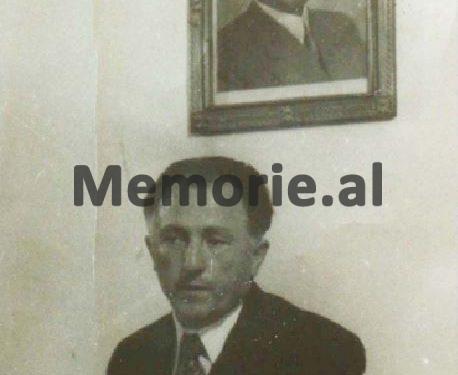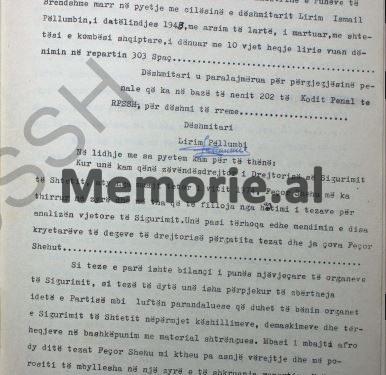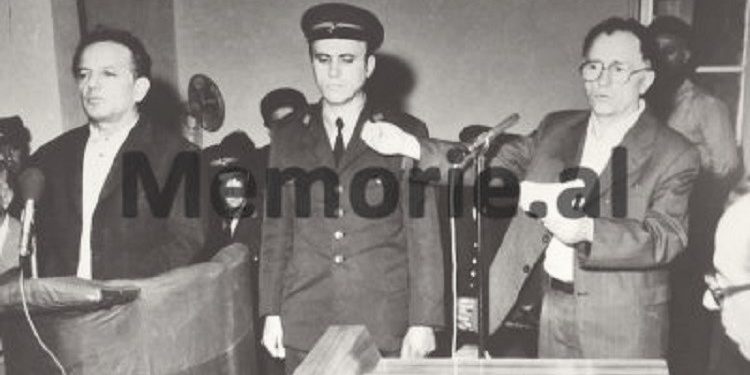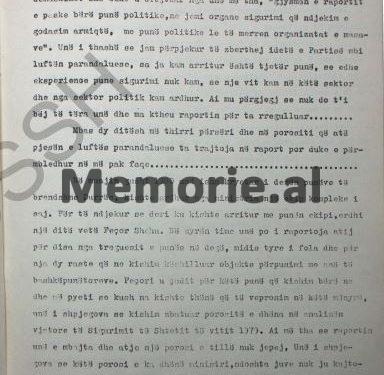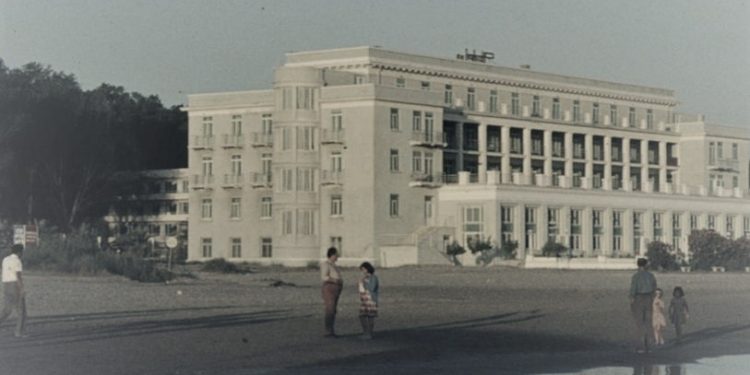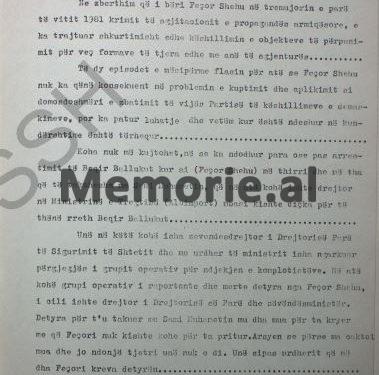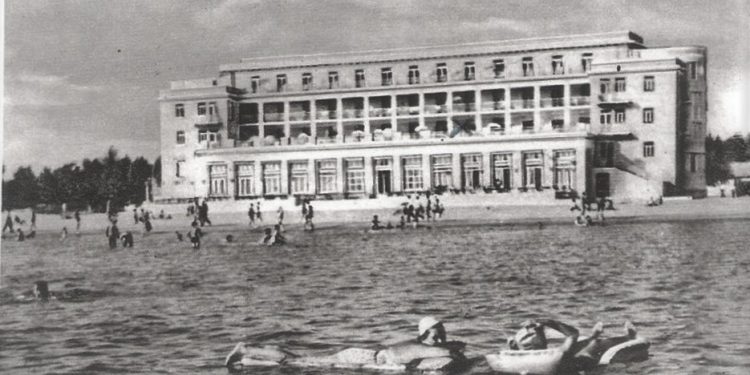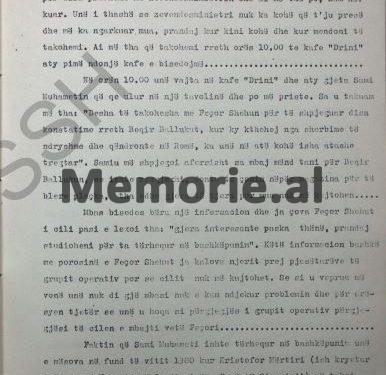By Dashnor Kaloçi
Part twenty-nine
Memorie.al / Exactly 43 years ago, on the morning of December 18, 1981, the Albanian Prime Minister Mehmet Shehu, who had held that position since 1953, was found dead in his bedroom (according to the official version, from a bullet from a pistol) in the villa where he lived with his family, at the entrance of the “Block” of the high leadership of the Albanian Party of Labor, just a few meters from the building of the Central Committee of the Albanian Party of Labor and also from Enver Hoxha’s villa. Although more than four decades have passed since that day, considered one of the most serious and notorious events of that regime, there is still no clear and accurate version regarding what happened to the former Albanian Prime Minister Mehmet Shehu on the night leading to December 18, 1981! However, even after the 1990s, dozens of testimonies and archival documents have been made public regarding that event, “the murder or suicide of Mehmet Shehu,” which continues to be the subject of numerous debates and discussions, even wrapping it further in mystery around the truth.
Based on this fact, in the context of publishing dozens of testimonies and files with archival documents from the secret fund of the former State Security and the Ministry of Internal Affairs, or the Central Committee of the Albanian Party of Labor, which we have published over the decades since the collapse of Enver Hoxha’s communist regime and his successor, Ramiz Alia, Memorie.al has secured the voluminous file “of the enemy Mehmet Shehu,” which has been extracted from the secret fund of the former State Security at the Ministry of Internal Affairs (now part of the fund of the Authority for Information on the Documents of the former State Security), where, with a few minor exceptions, most of them have never seen the light of publication and are made public for the first time in full.
In the mentioned file, there are the relevant facsimiles, the expert report of the investigative-operational group that was set up immediately on the morning of December 18, 1981, led by Koço Josifi (head of the Investigative Directorate of the Ministry of Internal Affairs of Tirana), the forensic doctors Dr. Fatos Hartito and Docent Bashkim Çuberi, the prime minister’s doctors, Milto Kostaqi and Llesh Rroku, as well as the criminalist expert from the Central Criminalistic Laboratory of the Ministry of Internal Affairs, Estref Myftari, assisted by high officials of that ministry, Xhule Çiraku, Elham Gjika, and Lahedin Bardhi.
Also, in the voluminous file that we are making public, there are testimonies from the family members of former Prime Minister Mehmet Shehu, from the service personnel, and his escort group, as well as from all other individuals who were summoned and testified about that event. Moreover, the documents in question, which we are publishing along with the facsimiles and relevant photos, provide more information regarding this matter.
However, even though we are dealing only with archival documents, it should be emphasized that; knowing how that system operated before the ’90s, we cannot claim absolute truth regarding what is written there, as not only from the individuals who provided their testimonies, but also from the investigators of this case, it has been made known that the testimonies were obtained under pressure, intimidation, and physical and psychological violence, with some investigators going so far as to write them themselves while the witnesses or defendants merely signed them.
Continued from the previous issue
PROTOCOL OF THE INTERROGATION OF LIRIM PËLLUMBI, FORMER DEPUTY DIRECTOR OF STATE SECURITY AND CHAIRMAN OF THE INTERNAL BRANCH OF THE DURRËS DISTRICT, WHO IS SERVING A SENTENCE OF 10 YEARS IN POLITICAL PRISON IN SPAÇ, BY THE INVESTIGATOR OF THE MINISTRY OF INTERNAL AFFAIRS, FLORIAN KOLANECI
PROTOCOL
(Of the testimony of the witness)
Tirana, May 30, 1983.
I, Florian Kolaneci, investigator at the Ministry of Internal Affairs, interrogate in the capacity of witness, Lirim Ismail Pëllumbi, born in 1943, with higher education, married, of Albanian nationality and citizenship, sentenced to 10 years of deprivation of liberty, currently serving his sentence in Division 303 in Spaç.
The witness was warned of the criminal responsibility he bears, based on Article 202 of the Penal Code of the People’s Socialist Republic of Albania, for false testimony.
WITNESS:
Lirim Pëllumbi
Regarding the questions I asked, I have to say:
In August 1980, I was the chairman of the Internal Affairs Branch in Durrës; a complex team had come from the Ministry. To follow up on the progress of the team’s work, Feçor Shehu himself came. In my office, I reported to him on some of the work indicators in the Branch; among other things, I also mentioned a couple of cases that we had advised for processing through collaborators. Feçori was surprised at the work we had done and asked who had told us to act this way. I explained that we had implemented the orders given in the annual analysis of State Security in 1973.
He told me; “I have kept the report, and such an order is not given there!” I explained to him that this order was given by the minister and perhaps he did not remember. I stood up and took the notes we had kept in the safe from the analysis and read the minister’s orders to Feçori. He said: “I do not remember, but I am surprised that only here in Durrës am I seeing that you have acted according to this order. I have not encountered it elsewhere, but let’s see!”
I do not remember whether this happened before or after the arrest of Beqir Balluku, when he (Feçor Shehu) called me and told me to meet with Sami Muhameti, who at that time was the director at the Ministry of Trade (Albimport), as he had something to say regarding Beqir Balluku. At that time I was the deputy director of the First Directorate of State Security and, by order of the minister, I had been appointed the operational group leader for pursuing the conspirators. At that time, the operational group reported and received assignments from Feçor Shehu, who was the director of the First Directorate and deputy minister. The task to meet with Sami Muhameti was given to me since Feçori did not have time to wait for him.
The reason why it was assigned to me and not someone else, I do not know. Following the order given to me by Feçori, I completed the task. At that time, I had seen Sami Muhameti a couple of times in the corridors of the Ministry of Foreign Trade, and on another occasion, the director of Artimpeksi introduced us. Besides that, I had seen him a few times getting into a car with Feçor Shehu. As per the orders I received from Feçor Shehu, I called Sami Muhameti and told him that you had requested to speak to the deputy minister about some issues, and he confirmed, saying he had asked for that. I told him that the deputy minister did not have time to meet him and had assigned me, so I asked when he would be available for us to meet. He suggested we meet around 10:00 at Café “Drini” where we could have a coffee and talk.
At 10:00, I went to Café “Drini” and found Sami Muhameti sitting at a table waiting for me. As soon as we met, he said to me, “I wanted to meet with Feçor Shehu to discuss some findings regarding Beqir Balluku when he returned from various services and stayed in Rome, where I was at that time a trade attaché.” Sami explained to me, as I recall now, about Beqir Balluku, that he was a rraqexhi (a type of informal trader), wanting to be taken around the warehouses to buy goods, and mentioned other things, though I don’t remember them.
After our conversation, I made a report and sent it to Feçor Shehu, who, after reading it, said: “He has said some interesting things, therefore study it to bring him into collaboration.” I sent this report along with the instructions of Feçor Shehu to one of the members of the operational group, though I don’t remember to whom. As for what happened later, I don’t know anything, as I did not follow the matter and for the other reason that I was removed as the head of the operational group, a responsibility that Feçori himself took.
I learned later, at the end of 1980, that Sami Muhameti had withdrawn when Kristofor Mërtiri (former chairman of the Special Branch in the First Directorate of Security) met me outside the House of Officers of the Ministry of Internal Affairs in Tirana and told me: “By order of the minister (Feçor Shehu), we need to bring Sami Muhameti from Lushnja to Kavajë, or to Shijak in the Durrës district, who we have… so you speak with the First Secretary of the Party Committee of the Durrës district and tell me his response, so that I can then inform the chairman of the Lushnja Internal Branch to start the documents as a cadre.” The issue was set in motion, but the arrival of the documents from Lushnja was delayed. They arrived in December 1981.
It must have been the end of 1979 or the beginning of 1980 when Feçor Shehu became minister and came to Durrës to analyze a problem that I don’t remember. After we finished the analysis, Feçor Shehu told me, “Let’s check in with the First Secretary of the Party Committee, as he has noted that when I come to Durrës, I have not met him.” When we went to the Party Committee, among other things, I raised several issues regarding Marjeta Shehu, such as: “Driving around Durrës in a ‘Volvo’ with her husband, following trends and becoming a bad example; Marjeta associates with everyone, brings them to Hotel ‘Adriatiku’ and drinks with them in a way that is unbecoming for a woman; her mother-in-law (Marjeta’s mother) boasts about Mehmet Shehu in the shops of Durrës and treats her husband poorly.”
I suggested that these matters should be reported to Mehmet Shehu, so that he would be informed; the First Secretary of the Party Committee of the district shared this opinion. At that time, Feçori said, “This issue is troublesome; it depends on how the Prime Minister receives it if you tell him.” Around the same time, both I and the secretary of the Party Committee told Feçori that “you should inform the main Party leader.” He replied, “Oh, comrade secretary, you know how delicate these matters are because, once before when you raised something, the main leader drew our attention; why is State Security dealing with this?”
In the summer of 1981, the external surveillance of State Security recorded a meeting of a French operative who was sailing at sea (in a sporting sailing boat) with an unknown person. The Frenchman lowered the sails, and the boat remained in place; the unknown person had placed his hand on the boat, creating the impression from afar that he was conversing with the foreigner. After about 20 minutes, the Frenchman hoisted the sails and left, while the unknown person swam parallel to the shore, heading towards the leadership’s residence area on the beach. Near the “Iliria” pier, the observers saw that the person who had been with the Frenchman at sea was Marjeta Shehu.
After she emerged from the sea, she entered her house in the ‘Block’ of the beach and for about an hour, while alone, went and sat among foreigners at the “Adriatik” Hotel’s terrace. The foreigners she sat with were from foreign states, such as embassy staff and tourists. The next morning, the head of the surveillance group, Ilia Bardhi, and the deputy head of the Branch, Bardhyl Çuçi, came to my office and explained the incident to me. I ordered that an operational record be made and once they did so, I immediately sought permission from the deputy minister who was expecting me for an urgent matter. Around 11:00, I arrived at the ministry and met with the deputy minister who had State Security under his supervision and provided him with the operational record for review. After he read it, he told me to deliver it to the minister.
Based on this order, I went to Feçor Shehu, who read the operational record and asked, “Could the observers have made a mistake? There could have been other people at sea, as viewing the sea from the shore can create optical illusions!” I insisted, telling him that I had also asked the observers these questions, and they did not make any mistakes. In these circumstances, he said to me, “Alright, I understand the problem now—destroy the operational record so that there is no documentation left in our organs regarding the Prime Minister’s wife, so we can stay in line with the Platform.” During our conversation, he emphasized that “we, as State Security, will not establish a network to surveil the children of our comrades, but when we notice things, we must address them.”
After returning to Durrës, I informed Bardhyl Çuçi, Ilia Bardhi, and Mehmet Sejdarasi that I went to the ministry and upon learning about the situation, they told me to keep no documentation, and I burned it in the stove. I should also add that in the aforementioned meeting, when Feçor Shehu said that we should be careful to raise issues about the children of our comrades, he stated: “We have come to a point where we are doing self-criticism regarding the engagements and marriages of the comrades’ children.” I did not understand what he was referring to. He repeated this phrase again when he came to Durrës one Sunday in September 1981, while I, Bardhyl Çuçi, and Hasan Caslli were present; neither I nor my two friends understood what he was referring to and about which engagement…?!
In mid-October 1981, I had sent several files to the ministry for operations, and in the corridor, I encountered Feçor Shehu, who asked why I had come. After I explained the reason to him, he said: “After you finish, come see me for a bit.” When I went to him, he informed me that “the issues you raised in Durrës regarding Mehmet Shehu’s children, especially about Marjeta Shehu, I reported to him and he received me very well. You will not see Marjeta coming to Durrës as before, so you should have a clear conscience that you have fulfilled your duty and the matters have gone to where they needed to go.” After this conversation, I returned to Durrës and told this discussion to Bardhyl and Mehmet Sejdari.
Around the end of December 1981, Minister Feçor Shehu summoned me and asked for an explanation because I had not informed the ministry about the arrest of Xhovalin Velça (Marjeta Shehu’s brother) in 1979?! I explained my actions as I had carried them out. He called the deputy minister responsible for the security of the leadership and told him that I had informed you about the arrest of Marjeta’s brother, but on the phone, he said, “I do not remember,” while when he arrived in Feçor’s office, I explained it to him and he accepted it. At that moment, I told Feçor Shehu, “Marjeta is like a child; you know about the incident involving her meeting with the Frenchman at sea, for which I provided the operational record.” At this moment, Feçor Shehu denied the existence of the operational record from my end.
I told him that I had brought him the record and that he had read it; moreover, the relevant deputy minister had seen it beforehand. He (Feçori) said, “I don’t know, no.” I did not prolong the debate because I had informed the Central Committee about this issue. After this conversation, I left for Durrës. On January 5, 1982, around 16:00, I was summoned for a matter by the deputy minister in charge of securing the leadership, and when I did not agree with him, we went to Feçor Shehu. There, after the situation was clarified, the deputy minister left, and Feçor Shehu addressed me; “Listen, Lirim, I wrongly doubted you that day; I remembered that you had brought me the operational record,” and he asked me to explain once again Marjeta’s meeting with the Frenchman, as he said he remembered it well, broadly speaking.
As the conversation continued, Feçor Shehu told me: “The matters you raised concerning Mehmet Shehu’s children, I told the First Secretary of the Central Committee of the Party, and he said, ‘The comrade from Durrës acted very well to raise these issues.’” After this conversation, I left. I should add that on January 5, 1982, by order of Feçor Shehu, I made an operational record about two things: the arrest of Marjeta’s brother in July 1979 and the meeting of Marjeta with the Frenchman at the beach. This record, after being typed, was handed to Kristofor Mërtiri by Feçori himself, with the instruction to place it in her operational file, which was being opened./Memorie.al
To be continued in the next issue




